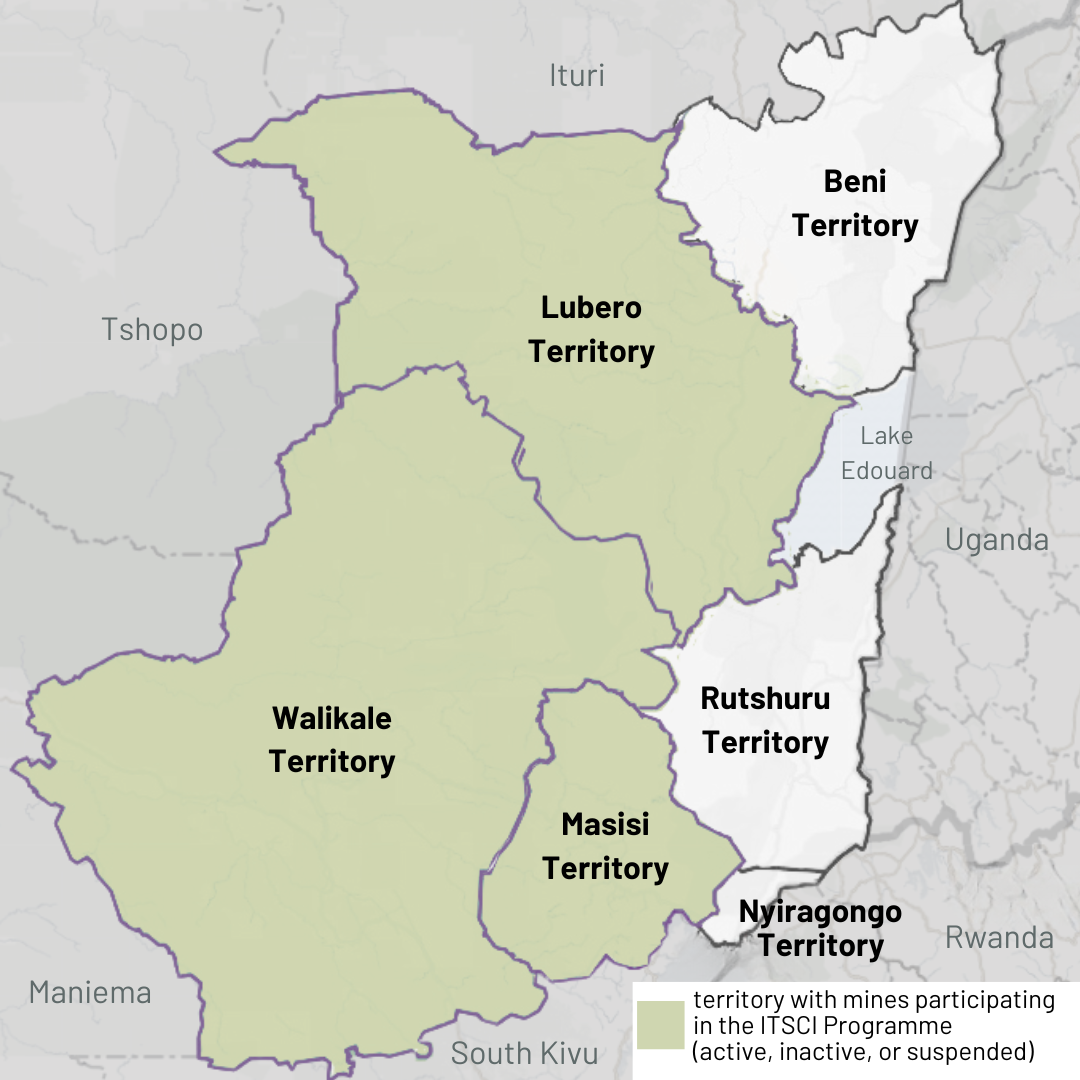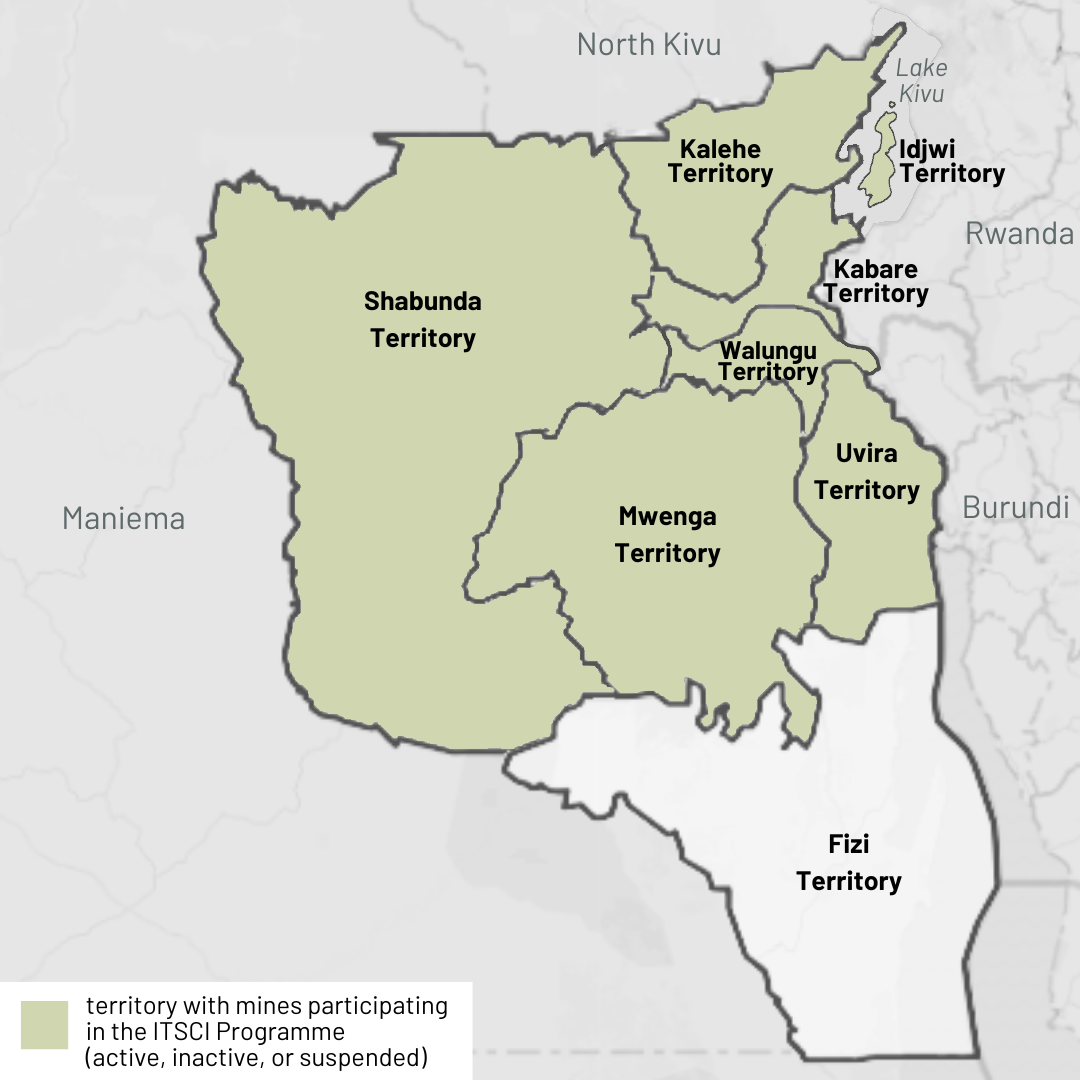Please note that the situation is evolving daily, and our primary focus remains on supporting and ensuring the safety of our locally based field teams. We continue to receive daily communication from them as the situation evolves and important details are provided directly to ITSCI members. We are providing brief public updates on key changes but are not publishing daily updates on the rapidly evolving situation. See our previous updates here.
Despite the peace agreement signed on Friday 27th June 2025 between the Democratic Republic of the Congo (DRC) and Rwanda, the situation in North and South Kivu Provinces, DRC, remains concerning due to the ongoing presence of non-state armed group M23 and their affiliated groups on the one side, and a large number of ‘Wazalendo’ non-state armed groups on the other. ITSCI continues to closely monitor the rapidly evolving situation in those areas and take appropriate actions where necessary, as recommended by the OECD Guidance.
ITSCI continues to monitor and engage with local state services, mining stakeholders, and civil society, including during local multistakeholder committee meetings (Comité Local de Suivi) facilitated by ITSCI, and positive actions are taking place.
We provide an update on those recent developments and ITSCI actions below.
South Kivu
The suspension of all ITSCI activities, including tagging by state mining services at all ITSCI-monitored sites in Kalehe, Idjwi, and Uvira territories remains unchanged (see previous statement here).
The territories of Kabare, Mwenga, Walungu, and Shabunda, are under control of the DRC government, with the presence of multiple Wazalendo non-state armed groups fighting alongside, and sometimes against, the Congolese Army (FARDC). In Walungu territory, clashes between those groups and M23 non-state armed groups also continue to be reported. Instances of violence, illegal taxation along mineral transport routes and mineral fraud are being reported. ITSCI follows up on these issues via the ITSCI incident reporting mechanism.
In past months, ITSCI has worked with state services and deployed good faith efforts to raise the awareness of artisanal miners and negociants to respect traceability procedures and transport ITSCI tagged minerals to DRC state-controlled areas in neighbouring Maniema Province for onward trade and export, aiming to mitigate current risks of mineral fraud from those territories to Bukavu. Due to failed mitigation attempts and in alignment with the recommendations of the OECD Guidance, all ITSCI activities including tagging by state services have been suspended in Kabare, Mwenga, Walungu territories, and in the Nzovu/Kigulube area, east of Shabunda territory.
In the rest of Shabunda territory, efforts by ITSCI to raise awareness among state services and local mining operators to establish alternative mineral transport routes have shown progressive improvements, with ITSCI-tagged minerals transported along those routes to neighbouring Maniema Province for onward export. ITSCI activities, including monitoring by ITSCI field teams and tagging by state services continue in those areas.
North Kivu
Since our last update in June 2025, the resumption of ITSCI activities in Walikale territory continues smoothly.
There remain risks of illegal taxations by non-state armed groups ‘Wazalendo’ in that territory. Encouragingly however, incidents recently raised by ITSCI at local multi-stakeholder committee (CLS) led to mitigation actions and interventions of local authorities and state security forces and to the removal of road barriers. The successful mitigation and resolution of this incident enabled ITSCI and state services to resume tagging at additional sub-sectors.
In total, ITSCI tagging has now resumed at 23 sub-sectors out of the 27 sub-sectors that were active prior the suspension of activities in Walikale territory. The 4 remaining sub-sectors that remain suspended are located at the border with Masisi territory and where a resumption of activities is currently not possible due to insecurity in that area.
Minerals tagged in Walikale territory are transported to Maniema Province for onward export, as part of interprovincial mineral transport agreement and procedures that are in place between both provinces and with support from ITSCI.
All activities in the North Kivu territories of Masisi and Lubero remain suspended.
Goma and Bukavu
The situation in Goma and Bukavu remains unchanged. All ITSCI activities are suspended in both provincial capitals.
Activities in other parts of the Great Lakes Region
Despite the current situation, mining activities and tagging by state services continue in several parts of the DRC, including Haut-Katanga, Haut-Lomami, Lualaba, Maniema, Tanganyika, and Tshopo Province, as well as in Burundi and Rwanda.
ITSCI continues to closely monitor the security developments through daily communications with our field teams.
-END-
ITSCI whistleblowing mechanism
Anyone in the region can provide evidence or information on risks directly or via our whistleblowing mechanism. ITSCI whistleblowing procedure and contacts are available online www.itsci.org/contact/. The confidential ITSCI whistleblowing address is [email protected].
Previous publications on this topic
- ITSCI welcomes the peace agreement between the DRC and Rwanda (July 2025)
- Recent Developments in North and South Kivu, DRC (April 2025)
- ITSCI statement on the recent European Council sanctions (March 2025)
- Update on the situation in North and South Kivu, DRC (February 2025)
- ITSCI reports that M23 have taken possession of an ITSCI office and other equipment and condemns all illegal actions by the non-state armed group (February 2025)
- ITSCI clarifies the role of its 3T traceability and due diligence Programme (February 2025)
- Escalating security situation in North and South Kivu (January 2025)
- ITSCI update on the security situation in North Kivu Province (January 2025)
Contact
Contact us at [email protected]
For media enquiries, contact [email protected]
Annex I Map of North Kivu and its territories

Annex II Map of South Kivu and its territories

